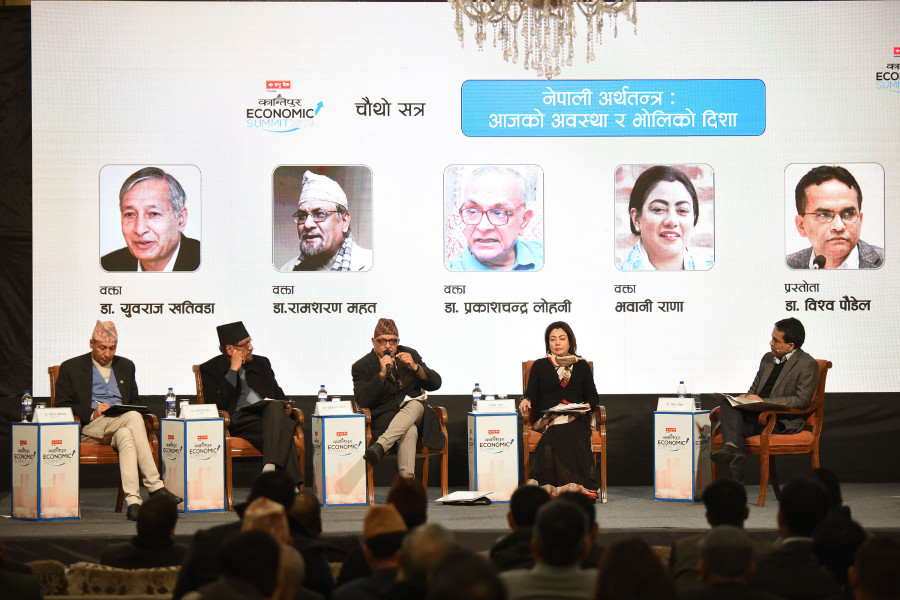Money
Finance minister claims the country is on the course of broad-based economic growth
But the World Bank says the economy will expand by only 6.4 percent in the current fiscal year, well below the government target of 8.5 percent.
Prithvi Man Shrestha
Finance Minister Yuba Raj Khatiwada has claimed that the country’s economy is moving towards broad-based growth amid concerns that growth might stumble this fiscal year due to sluggish spending by both the government and the private sector.
“Every province achieved a growth rate of 6-8 percent in the last fiscal year,” Khatiwada told the Kantipur Economic Summit on Thursday. “The current growth rate of the economy is not just a bubble driven by post-earthquake reconstruction.”
The government has targeted a growth rate of 8.5 percent in the current fiscal year, and aims to achieve 9 percent growth annually over the next five years. But the World Bank's recent projection shows that Nepal’s economy will expand by only 6.4 percent in the current fiscal year.
As of January 8, the government’s capital expenditure had reached a mere 12.24 percent of the total allocated capital budget. Credit issued to the private sector grew by just 5 percent as of the first four months of this fiscal, according to Nepal Rastra Bank.
This is far below the annual target of 21 percent, suggesting that the private sector is not receiving the required credit to boost growth.
The finance minister admitted that the country needed to do more to increase production for both domestic and external markets. “Not only manufactured products, but now we are also in a position to export hydropower, and we can also boost tourism as part of service export.”
Khatiwada claimed that the country had improved the investment climate as there is no load-shedding or labour problems, and legal reforms are undergoing.
Addressing the summit, former finance ministers questioned whether the current growth rate of the economy indicated that the country was on a high growth trajectory as Khatiwada had declared.
Former finance minister Ram Sharan Mahat said the growth in the last few years was achieved because of the lower base of the economy which has badly affected by the earthquake and Indian trade blockade.
“The government’s expenditure in the area of capital formation is just 7-8 percent of the economy which is not enough,” he said.
Mahat also questioned whether the government was focussed on boosting the economy or not, pointing to a number of government initiatives such as the Prime Minister Employment Programme terming them distributive.
The Prime Minister Employment Programme has invited criticism from different quarters for its nature of distributing cash to unemployed youths for different projects instead of creating an environment where they could get jobs.
Finance Minister Khatiwada defended the government’s initiative related to social security and employment as measures that needed to be taken to ensure the fundamental rights envisioned by the constitution. “I have, however, been saying that it should have a certain limit,” he added.
Another speaker former finance minister Prakash Chandra Lohani stressed that the government should develop a few sectors in a way that that could transform the economy, like Bangladesh did in the readymade garment sector and India did in the area of information technology. Tourism can be such a sector for Nepal,” he said.
During another session, the private sector complained about the culture of red tape in the government machinery which has discouraged domestic and foreign private investments. Nepali Congress lawmaker and noted industrialist Binod Chaudhary said that the government machinery didn't make timely decisions on many investment proposals from the private sector which discourages investors.
“Even if you say no, you should do so in a timely manner,” he said. The government’s failure to ensure a conducive environment for business is the reason why the Special Economic Zone in Bhairahawa and the Garment Processing Zone in Simara are failing to attract investors, he added.




 18.12°C Kathmandu
18.12°C Kathmandu













